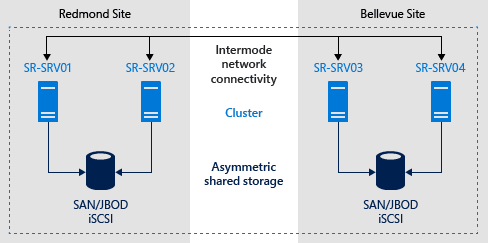How to Configure a Reliable Windows Failover Cluster: A Step-by-Step Guide by Medha Cloud


Configuring a Windows Failover Cluster can be challenging, especially when it comes to selecting the right hardware and storage solutions. With options from leading manufacturers like Dell, HPE, Fujitsu, and Lenovo, and the need to balance performance, reliability, and cost, the task can seem daunting. At Medha Cloud, we specialize in guiding businesses through such intricate setups, ensuring optimal configurations tailored to their unique needs.
In this article, we’ll walk you through a practical approach to building a failover cluster, covering hardware selection, RAID controllers, shared storage options, and planning tips.
Choosing the Right Manufacturer For Failover Cluster
The first step in configuring a failover cluster is selecting a manufacturer with strong regional support. Hardware reliability and post-purchase services play a significant role in maintaining high availability.
- Dell Technologies: Known for excellent Next Business Day (NBD) support, Dell also offers premium 4-hour response plans for critical setups.
- Hewlett Packard Enterprise (HPE): Offers robust hardware options with a reliable 4-hour response warranty, although their NBD support may vary in quality.
- Avoiding Pitfalls: Manufacturers like Fujitsu, Supermicro, and Lenovo may not provide the same level of consistent support across all regions.
Medha Cloud Insight: Always verify the availability of regional support, spare parts, and service agreements before making a choice.
RAID Controllers: A Key Decision Point
RAID controllers are critical to storage performance in failover clusters.
- Cache Matters: A RAID controller with at least 8GB of cache is essential for modern workloads to ensure smooth operation.
- HBA vs. RAID Cards:
- HBA (Host Bus Adapter): Direct access to drives, ideal for software-defined storage.
- RAID Cards: Hardware-based RAID with enhanced performance and onboard cache.
Medha Cloud Tip: Match your RAID controller to the performance needs of your failover cluster, balancing cost and functionality.
Planning for Performance and Capacity
Effective capacity planning ensures your failover cluster meets current and future workload demands.
- Storage Requirements: Define your storage capacity needs, focusing on Input/Output Operations Per Second (IOPS) and scalability.
- RAM and CPU: Choose hardware based on workload intensity. For virtualization-heavy environments, higher cores and threads with sufficient RAM are non-negotiable.
- Storage Type: NVMe drives provide unparalleled performance, while SAS drives offer reliability at a lower cost.
Medha Cloud Approach: We assist businesses in evaluating workload requirements, ensuring their failover clusters are optimized for performance and scalability.
Shared Storage Options for High Availability
Shared storage is vital for failover clusters to ensure seamless operations during node failures.
- StarWind Virtual SAN: A software-defined storage solution offering High Availability (HA) without the need for expensive SAN hardware.
- Advantages: Cost-effective, easy to configure, and reduces hardware dependency.
- HCA (Hyper-Converged Appliance): Combines storage, compute, and networking for an all-in-one solution.
- Microsoft Storage Spaces Direct (S2D): An alternative software-defined solution for Windows environments.
- Traditional SAN Solutions: If budget allows, consider options like Dell EMC or HPE 3PAR for dedicated SAN hardware.
Medha Cloud Integration: Our team often recommends StarWind solutions for their cost efficiency and simplified management, making them ideal for SMBs and enterprises.
Leveraging Expert Resources
Configuring a failover cluster requires not only technical expertise but also reliable resources to stay updated.
- Manufacturer Documentation: Dell, HPE, and Fujitsu offer detailed guides and online configurators.
- Online Communities: Platforms like Reddit’s r/sysadmin or Spiceworks forums provide real-world insights.
- Training and Certification: Manufacturer-specific training (e.g., Dell EMC or HPE ATP) ensures you stay ahead of the curve.
Medha Cloud Resource Hub: Our team provides hands-on workshops, training, and resources to empower IT teams in mastering failover cluster configurations.
Why Choose Medha Cloud?
At Medha Cloud, we specialize in designing and implementing IT solutions, including Windows Failover Clusters, tailored to your business needs. Our expertise spans hardware selection, software-defined storage, and performance optimization, ensuring your infrastructure is robust, reliable, and scalable.
By following this guide and leveraging Medha Cloud’s expertise, you can confidently set up a failover cluster that ensures high availability and performance for your organization.
Contact us today to learn how we can help you configure a failover cluster that delivers on your business goals!
Reach us at:
- India: +91 93536 44646
- US: +1 646 775 2855
- Website: medhacloud.com
- Email: info@medhacloud.com

Sreenivasa Reddy G
Founder & CEO • 15+ years
Sreenivasa Reddy is the Founder and CEO of Medha Cloud, recognized as "Startup of the Year 2024" by The CEO Magazine. With over 15 years of experience in cloud infrastructure and IT services, he leads the company's vision to deliver enterprise-grade cloud solutions to businesses worldwide.
